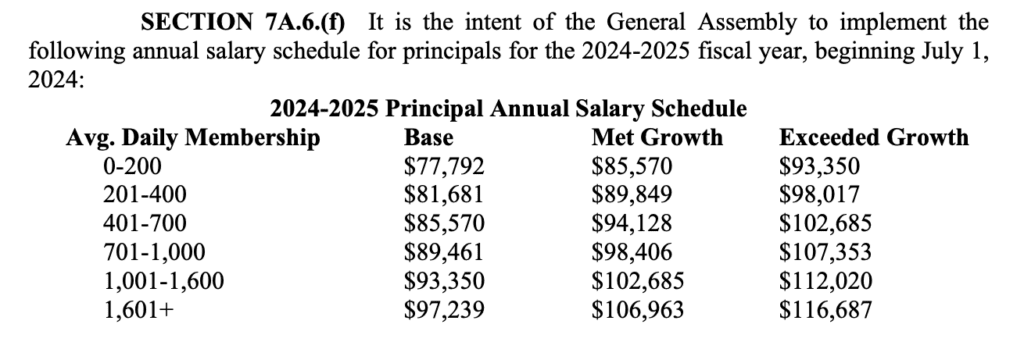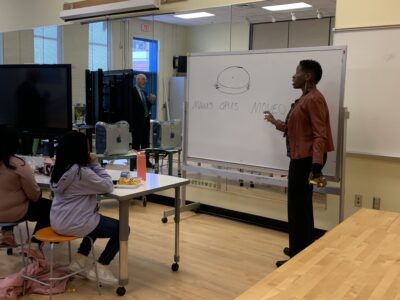

Share this story
- The new state budget included an average 7% base pay raise over two years for school principals, calculated based on growth and ADM. It also included bonuses for principals of schools in the top 50% of school growth, and updates on principal licensure.
- Per recent DPI guidance, schools should implement new pay raises by Dec. 31. December is also when a hold harmless for principal pay will end.
|
|
The new state budget, which passed Sept. 22 and became effective on Oct. 3, included an average 7% base pay raise over two years for school principals, calculated based on growth and Average Daily Membership (ADM).
The 4% base pay raise for 2023-24 is retroactive to July 1. The budget became effective last month, meaning October’s paycheck was the earliest that educators could see those raises.
However, recent guidance from the N.C. Department of Public Instruction (DPI) said “there is no timeline stipulated related to implementing the salary changes or providing the retroactive adjustments.”
“It is advised to get those completed prior to December 31st,” a DPI presentation says.
December is also when a hold harmless for principal pay will end.
In fall 2022, state Superintendent Catherine Truitt directed federal Covid-relief dollars to fund a hold harmless for principals through December 2023. This came after a provision in the 2022 budget would have based pay on one year of school performance data — from the 2021-22 year — instead of three years of data.
“The change could result in substantial pay cuts to some of North Carolina’s best principals, as it tied salaries to school performance during a year when schools continued to face significant disruptions from the COVID-19 pandemic,” a DPI release from August 2022 said.
(The modification) negatively impacted approximately 360 principals, roughly 15 percent, whose schools had a pre-pandemic history of high performance. These potential pay cuts range from $7,200 to $18,000 over 12 months. By using federal ESSER III funding, these principals will not receive a reduction in pay for the portion of the salary that is determined by the schools’ growth performance, holding them harmless from the impact of COVID-19 and helping to ensure that they are retained by their school district.
August 2022 DPI release
After the hold harmless provision ends in December, pay changes based on growth will take place in January. This year’s budget does allow for the higher score out of two prior years to determine principal pay. You can read more about how the score is calculated for principal pay on page 152 of the budget.
You can view the new principal salary schedules below. You can also view the monthly salary schedule for principals on page 14 of this DPI document.




The ADM bands change each fiscal year, the DPI presentation said, and are based on first month ADM for each district from the 2022-23 fiscal year.
“Beginning in the 2024-2025 fiscal year, it is the intent of the General Assembly to include in the calculation of the average daily membership of a principal’s school the average daily membership of any prekindergarten students in membership at the school,” the budget says.
In order to account for this change, the DPI presentation said new policies, processes, and reports will have to be developed in order “to determine how to consistently account for Pre-K students and calculate the ADM.”
Pre-K ADM is not included in any other State Public School Fund (SPSF) allocations, per DPI.
“SPSF is intended for K-12,” the DPI presentation says. “Unless Pre-K is specified in legislation governing the programs and funding it is assumed the funds may not be used for Pre-K purposes.”
Principal bonuses and licensure
The budget also directed DPI to “administer a bonus in the 2023-2024 fiscal year to any principal who supervised a school as a principal for a majority of the previous school year if that school was in the top fifty percent (50%) of school growth in the State during the previous school year.”
Per DPI, the majority of the school year is considered six or more months.
“If the principal worked exactly 6 months of the year in one school and 6 months of the year in another, the principal is awarded the higher bonus of the 2 schools he/she supervised,” the DPI document says.
You can read answers to more frequently asked questions on DPI’s website.
The deadline for paying principal bonuses was Oct. 31, per the budget and DPI, “to qualifying principals employed as of October 1, 2023.”
Here is a look at the bonus schedule for principals.


The new budget did not include anything on principal licensure, but Session Law 2023-125, which passed into law at the end of September, does. That law makes several changes to principal licensure that were recommended by DPI.
First, it no longer requires classroom teaching experience for school principals.
Previously, state law required that educators have at least four years of experience teaching to become a principal. Under SL 2023-225, that statute changed to require “at least four years of experience as a licensed professional educator.” Such educators could include counselors or social workers, for example.
The law also eliminates the requirement to pass a state-adopted exam and replaces it with a portfolio-based assessment where principal candidates can more broadly make their case for principalship. The law also sets forth requirements for assistant principal licenses, including a one-year internship.
The budget directs the Professional Educator Preparation and Standards Commission (PEPSC) to work with DPI and the NC Principal Fellows Commission to “develop a portfolio-based assessment system for use in applications for administrator licensure.” PEPSC will then present recommendations to the State Board of Education for approval by June 15, 2024.





